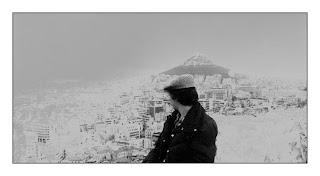What is behind the mists of time?

The story of Tolkien's The Silmarillion is very complicated and long. Only by reading it, I think, do you get a sense of the span of time, in anything like human reckoning, that is depicted. In fact, time itself doesn't even come in until late. And elves and humans come in even later. Then there are ages of tragedy. And at the end of all that, when already so much has been lost, when already there have been so many passings, do we even begin to hear names that are familiar in The Lord of the Rings. For The Lord of the Rings is the tale, the story, of the events that end the Third Age of Middle Earth, and begin the Fourth. And so we are again saying goodbye to what were already only vestiges, only echoes, only descendants of many, many generations back.
And that brings us, not to the present day of our world, but more like ten thousand years ago or more. There is in fact not just one curtain of mist that separates us from our past, but many such curtains, separating us from our pasts.
Most profoundly,The Silmarillion is tragic, from beginning to end. You have to read it for yourself, of course, if you want to really feel it, feel the sadness. There are only a few places in The Lord of the Rings that I can think of where you get even a hint of the sadness that pervades The Silmarillion: The moment at the Grey Havens when Frodo says goodbye to Sam, Merry and Pippin; and the appendices, especially the story of Aaragorn and Arwen. There is an echo, or more accurately, a vestige, of the tragedy of the Silmarillion in the person of Denethor, whose pride and arrogance wreak havoc amongst his people and his children.
So Tolkien broke through those veils, and found sadness, and treachery, almost from the very beginning.
Just recently a friend was describing to me her trip to Washington, D.C., for the interment of a decorated Navy veteran, celebrated in solemnity with full honors. She described the profound martial atmosphere - an air that Tolkien himself was intimately familiar with. She then told me a story of a chaplain who had been recently visiting several dying men, individually, unrelated to one another, except that they were veterans of World War II. This pastor was hearing stories of these men, in their dying breaths, of the sadness and terror and brutality - and tragedy - of their experience in that war. Not honor and glory and righteousness, but bare violence and fear.
In that context I mentioned to my friend a book titled Things Hidden Since the Foundation of the World. It's a collection of work by Rene Girard. He also has peered through the mists of time, and what he sees is what he calls the founding violence of human culture - the violence, and violent acts, that are in fact the basis of human culture from the beginning.
I'm working on my study of Tolkien and Barfield's individual journeys back behind the mists and veils of time, and I'm thinking that they too saw that violence. And I'm wondering what they thought of it.


Comments
There aren't any that I know of, but let me qualify that. I looked long and hard for a decade or so - through the 90's. I studied philosophy as a grad student, and wrote my thesis on Barfield's Saving the Appearance. I self-published that thesis as Philosophy and the Evolution of Consciousness: Owen Barfield's Saving the Appearances. You'll find there any connections I made between Barfield's thought and mainstream philosophy.
I haven't looked at academic philosophy in a long time, so I don't know what's out there these days. If you find anything, I'd be interested to know. You might also check out http://barfieldsociety.org for other contacts or leads.